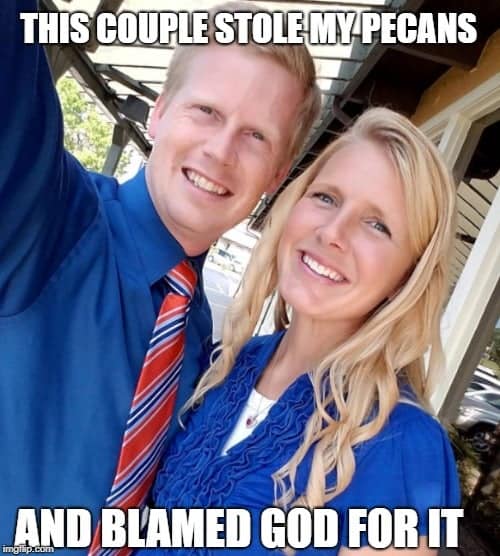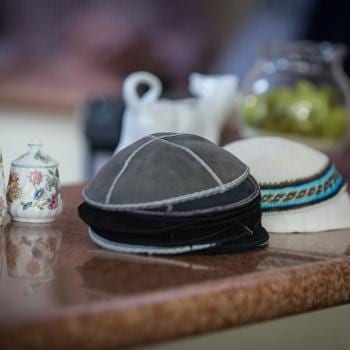The Vision, pp. 151-159, 183-188
Magdalene has has a personality transplant. It’s been a week since the “Trio” forced her to tell the story of her childhood, her life as a runaway, and her violent kidnapping, and she’s spent that week reading the Bible. Avidly. Excitedly. Because of course she has.
Workplace Dynamics
By the way—I’m going to stop giving specifics on the weird, weird workplace dynamics Cheyenne has going on here, because it’s just weird. They’re constantly mean to each other, and brush it off as joking. Cheyenne is rattling away about Asher getting back … so Bobbie Jo gets annoyed and tells her to “shut your trap.” Things like that. Constantly. And yet, I think Debi thinks it’s a pleasant workplace because it’s so freewheeling, light-hearted, filled with inside jokes and laughing at each other, telling stories and having “deep” conversations.
For instance, Bobby says this to Cheyenne, referencing Asher:
“I cannot think when you are gushing endlessly over Big Red.”
And then this happens:
Julie, Magdalene, and Cheyenne stood frozen for about 10 seconds. Then they all exploded with screams of laughter.
But that’s not the end of it, because they all turn it around on Bobbie Jo:
Their voices chimed in together as each shouted their opinion. “She’s jealous. She wants a man! Did you hear her? She’s a girl, after all.”
… yeah.
What’s the Matter with Baptists
Anyway! Let’s return to Magdalene:
Magdalene’s rediscovered childlike wonder was refreshing. She had spent the week studying Scripture in a great rush—she was drinking in the information like a thirsty sponge. She just couldn’t seem to get enough. In addition, it appeared she had chosen to set aside the past.
Like I said: Magdalene has has a personality transplant.
Magdalene announces that she’s going to explain why Jesus is called the Lamb of God. You know, totally ordinary workplace conversation. Bobbie Jo access her of being “a discombobulated Baptist” and then … then … then this happens … and I cannot:
Cheyenne pretended to take offense, “Asher is a Baptist too, if you recall.” Then she lightened the mood with her imitation of a southern belle, “Theyafoah Ah simply will naht brook insults in that regahd.” She fanned herself and fluttered her eyelashes for emphasis, “I sincerely hope that someday in mah very near future, Ah too shall be a Baptist.”
What was that!?
Well okay then.
People like the Pearls tend to be fine with Baptists, though I’m not sure whether they themselves identify as Baptists. Presbyterians are a bit more highbrow, and the Pearls aren’t Amish or Mennonite (though they have a fetish). Lutherans are also too highbrow, although Methodists are maybe acceptable. Certainly not Anglicans or Episcopalians! And Catholics aren’t actually Christians. But I digress! Point is, these people are totally fine with Baptists, I’m honestly confused as to why Bobbie Jo is making fun of Baptists.
Salvation Anxiety
Here’s the thing though: this whole section is just one big interactive sermon. It’s both boring and grippingly important. Basically: it’s about how you can know whether you’re saved, and what makes you saved.
Full disclosure: I suffered from salvation anxiety as a teen. I believed I was saved, but being saved was not determined by actions—it was determined by beliefs and sincerity. I frequently questioned whether I was fully sincere, and I prayed the sinner’s prayer repeatedly hoping desperately that I “meant” it enough.
In part, I was terrified because I had never committed any big sin. I know that sounds backwards, but I had been taught that if I at all believed that I was a good person, I was bound for hell. I had to believe that I was a filthy sinner. I kid you not, I envied people who shared testimonies of drug-use and prostitution before eventual salvation. Those people knew they were filthy dirty sinners. They would never accidentally think they were maybe a good person, and thus doom themselves to hell.
Looking back now, I think all of this is a product of the extent to which Protestants, and especially evangelicals, have made membership dependent not on shared action but on shared beliefs. If membership (and thus salvation) came from church-attendance and from participating in rituals or doing good works, you can know whether you are saved—you don’t have to worry whether a fragment of doubt or a twinge of pride and self-worth is going to doom you. Within evangelicalism, you have to be extremely careful that you don’t ever think that any of these things—rituals, works—will help you get to heaven, because that would send you to hell.
This entire section of Debi’s book is one big anxiety-inducing pile of circular soul searching, in this case carried out by four teenage and twenty-something women and an online concordance.
What a mess.
Magdalene Is Always Wrong
Magdalene says Jesus is called the Lamb of God because he’s “harmless and passive” and humble, and Cheyenne instantly concludes that this means Magdalene isn’t saved. Cheyenne asks her why God accepted Abel’s sacrifice of a lamb, and not Cain’s sacrifice of vegetables. “Why did it have to be blood?” she asks.
Magdalene is unsure. Finally, Cheyenne says:
“Cain and Able both sinned. Abel sensed in his spirit that his sin deserved death. We call that conscience. He knew there was nothing good he could do to make up for his sin.”
This idea is so very central to evangelicalism, and it’s also really awful. When my child lies to me, I don’t conclude that his transgression is so terrible it can only be paid for with blood. WTF! No! Ironically, perhaps, my conscience actually cries out against the absolute injustice and horror of such an idea.
Horse thievery used to be punished with having a hand cut off—or being hung. I do not believe that was just. At all! In the same way, I don’t believe that any little act of wrongdoing is deserving of death.
Nope. No. Nada. Absolutely not.
Anyway, cue Julie:
“The Jews had it so easy. They didn’t have to struggle with this thing of repenting and believing with all your heart; they just had to believe enough to offer the lamb.
“I would have gladly done that if I could. Instead, I was never sure if I had repented correctly or if I had believed enough. Was I sincere? Had I surrendered to Jesus as my Lord? On and on such thoughts tormented me.
“Oh God, I hate being scared!” Julie uttered with unguarded emotion. Gone were her careful words. The others were a little surprised by her uncharacteristic openness.
Turns out Julie’s not actually saved either.
But seriously … I feel this so hard. Seeing it written out like this in a book by a fundamentalist would-be guru is somehow validating. This is an actual problem. Of course, as we’ll see, Debi is Quite Sure she has the solution (I’m going to argue that it’s not actually a good solution, but we’ll get there eventually).
Magdalene walked over to put her arm around Julie’s shoulder. “Hush Jules, don’t get so upset. You are one of the nicest people in the whole world. If anyone is gonna make it in, you will. The Bible says all you have to do is ask forgiveness for your sins every night.”
Personality. Transplant.
“Nope,” Bobbie Jo says, jumping in, but Magdalene isn’t having it.
“Jeepers, Bobbie Jo! You are the one that’s always telling Bible stories. Are you playing dumb or something? Everyone knows that’s what it says. I heard it often enough from my mom. It says you must repent of all your sins and confess them to God daily.”
This isn’t quite what I was taught—I never got the idea we were sin-counting like this. Once you asked for forgiveness, you were forgiven, even if you went on to mess up. Except if you messed up too badly and left the faith, or acted unrepentant, which was clearly a sign that you were never saved in the first place.
(You see the problem here?)
“Don’t let her get to you, Jules. You know that God is merciful. If repentance is in your heart, God will see it. I know that’s right!”
Personality. Transplant.
“Wrong answer!” Cheyenne booms.
Oh boy.
Julie wants to know what Cheyenne means.
“So do you stay saved if you don’t confess and forsake every sin? Besides, there was a time when I was 17 years old that I had a secret boyfriend. I know there was a whole lot of really bad sins that were not accidental. If I really meant it when I asked Christ into my heart, why did I sin so much?”
She had a secret boyfriend.
This is just so sad.
Again, Magdalene put her thin arm across Julie’s shoulder in a comforting gesture. “God would never lose one like you.”
Personality. Transplant.
Of course, Bobbie Jo and Cheyenne are intent on putting Magdalene in her place by explaining in grownup voices that God is exactly the kind of entity who would send Julie to hell, and happily so.
“Hey BoJo, tell them about the day you got left behind.”
Yes, Cheyenne calls Bobbie Jo “BoJo.” Maybe I just have a dirty mind, but I am not a fan of this nickname. Anyway, Bobbie Jo tells a story of coming upon some of Cheyenne’s clothes—they contrive a reason for her stripping at work—and believing that the rapture has happened and that she’s been left behind. That has happened to me before, because unlike most normal people at work, my younger siblings did sometimes strip and drop their clothes where they stood, instead of in the dirty clothes hamper.
Anyway, Bobbie Jo says she realized at that moment that she didn’t understand “repentance and faith” properly and that she was “through with all that hoping-I-was-saved” stuff.
“If I had died two years ago, I would have split hell wide open. That’s a fact.”
People should not live with this level of terror of being horrifically tortured for eternity. This is itself horrific.
Interlude
At this point their conversation is completely derailed by … Muslim terror things. More on this next week. I’m going t0 skip over all of this bad bad Muslims stuff and give you the rest of the conversation on salvation, which happens some time later. Next week is going to be really wild, by the way, and if you have any doubt, just ask Petticoat Philosopher in the comments, because she knows exactly what’s coming.
She has even chosen theme music for it.
Anyway! Let’s go to part II of the salvation conversation!
Word Search
Magdalene is using “Sword-searcher Bible software” on “the old laptop” to search for the term “repent of.” (Too bad she doesn’t have a Smartphone like the poor benighted Muslim girl.) Bobbie Jo suggests she instead search for “repent from.” Julie is around, insisting it says “repent of your sins somewhere.”
Magdalene does some more poking around, and then we get this:
“The word repent is in the Bible 112 times, and not one time does it say ‘repent of sin.’
…
Magdalene typed repentance in the search box and scrolled down the results. Suddenly she shouted, “Dead works! It says repent form dead works! I see it now!”
And here Magdalene starts to freak out.
Magdalene was bouncing with excitement. “Julie, I see it! I see it! We’ve been trying to place God with our confessions. No wonder we’ve both been scared out of our wits. Confession of sin is just dead works! Don’t you see? We’ve been trying to be good enough for God … and that’s dead works which kept us lost! Just like Cain offered a bunch of squash and beans, we were offering our works!”
I don’t buy this at all.
Someone confessing their sins in terror of hell is not trying to do a good work. Sure, there are probably “self-righteous” people who make an act out of the confession of sins—but that’s not what Magdalene and Julie were doing. This just seems like such an odd framing. It sounds like something Debi stumbled upon herself.
Frankly, this reads like it’s Debi trying to push her own theology in a way that’s acceptable within the gender roles she holds. She’s not writing theology or preaching—she’s just writing a novel, that’s all!
Sure, Debi. Sure.
Here’s the thing though—she’s also wrong! Sure, their search engine isn’t finding “repent of sin,” but that may be due to the translation they’re using, or the fact that they’re only using the word sin. There are more than one ways to say “repent of sin.” For instance, Mark says “repentance for the forgiveness of sin.” So does Luke. Jeremiah says “repent of their ways.” Acts says “repent of this wickedness.” 2 Corinthians chides those who have not “repented of the impurity, sexual immorality, and indecent behavior which they have practiced.” Revelation condemns those who refused to “repent of the works of their hands.”
Debi has found something she thinks it’s clever—Hebrews does speak of “repentance from dead works”—and has absolutely run with it, throwing contrary evidence to the wind. Also, the New Testament only mentions “dead works” twice, and it’s not at all clear on what they actually are. Debi’s embarking on a choose your own adventure rewrite of Bible, but we all expected that.
Salvation Blows Magdalene’s Mind
Magdalene goes on and on and on.
“We must repent from dead works and toward God! We don’t have to deal with our sins. Jesus already took care of them. We just have to quit offering our good fruit, like Cain did, and just accept God’s blood sacrifice! Wow! Where have I been?”
If Jesus already took care of all of your sins, why do you need to do anything at all? Also, what does “offering our good fruit” mean in this context? Clearly, you’re not supposed to stop doing good. (Actually, funny story, there were some segments of the early church that argued that this was exactly what this meant—that what we do does not matter, because bodies are ephemeral—or something—and therefore hedonism is in the cards.) If you’re not supposed to stop doing good and eschewing evil, the thing you’re supposed to stop is in your head.
Because again, I believed this. I believed that nothing we can do can get us into heaven. I believed that Jesus and Jesus alone could pay for our sins. I believed that we must put ourselves in his hands and trust him and his sacrifice alone for our salvation. But … I still worried I maybe hadn’t meant it enough.
And here’s part of why:
“I was never saved … so I never lost it! Neither were you, Julie. Salvation is knowing God. We only knew religious teachings and hoped it was enough!”
This idea that you could think you were a Christian and yet not be saved terrified me. What if I didn’t mean the right thing, or mean it enough? What if I wavered, for a moment, on the idea that I was a filthy sinner?
“Julie, my repentance was super classic dead works!”
Ughhh this just feels so off.
If repentance is public and affected, sure, it could be all for show. But I don’t think genuine contrition is “dead works.” Frankly, it’s not works at all! It’s genuine contrition.
“Just like Cain, I’ve been bringing my vegetables and fruit to try to appease God, but God has provided Jesus’ very blood to cleanse me, sick sinner that I am.”
This is basically a sermon.
“Hey!” In her joy, Magdalene interrupted her own thoughts. “Now i know why Jesus is called the Lamb of God!” Magdalene called with glee. Then she screeched out like an excited small child would, “I know! Oh, Jules … this is wonderful!”
Yikes.
The thrill in Magdalene’s soul was bubbling forth like cool, clean water. It was life … it was wonderful. It reminded them that God is still on his throne and that life is a wonderful gift.
A bit over the top, no?
Magdalene stood again and raised her hands, palms upwards, in a gesture of surrender. “Now I understand that it means when Jesus said, ‘It is finished.’ Salvation is done. His blood covered my sins. I don’t have to keep getting forgiveness … he paid it all. Past, present, future, I’ve bene forgiven!”
Tears streamed down her face.
Just. Wow.
Overcome by the wonder of it, the one time servant of Satan blurted out, almost singing, “Julie, I am forgiven … God has forgiven me … for everything … EVERYTHING!“
Servant. Of. Satan.
This book is something else.
Look, I want Magdalene to be happy. I’m glad she’s—apparently—found peace. But I also don’t know that this will necessarily last. I had all the information she has, and I still experienced salvation anxiety. Maybe she won’t, because she’s had this super obvious moment—I never did, which made me nervous. Sure, I remember the first time I prayed the sinner’s prayer, but it wasn’t this sort of fireworks.
Believe it or not, salvation anxiety isn’t new. In the early 1800s, evangelicals used to worry themselves into such a state trying to create an overly emotional salvation moment, and worrying that if they never experienced this, they weren’t really saved. This was one thing Horace Bushnell was pushing back against when he argued that children could naturally grow into salvation—he didn’t believe overly emotional salvation moments were necessary, and he worried that families tried to scare kids into them with threat of hellfire.
None of this is really new. Which is perhaps itself interesting.
Now Let’s Scare Julie
Finally, Julie speaks:
“Okay, I admit it … I am not really saved.”
This is cruel.
Julie looked embarrassed as her tears started to fall. “I’m tired of the whole thing. Just tell me what to do. I want to be saved.”
This is quite the workplace.
Yep, you heard that that right, they’re still at work. You may have forgotten. For. Well. Reasons. They’ve manipulated Julie into tears over the future of her eternal soul, at work.
“Magdalene’s face was full of joyful light. “Just turn from your old dead works of trying to be good. No, that’s not quite right. Quit turning yourself (sic) and just look to what Jesus did for you. Jesus is the only way for bad girls like me … and for good girls like you. Jesus paid the full price for sin. Oh, how much he had to pay and suffer for my terrible sin. I am forgiven!” Magdalene shouted with her fists thrust high into the air and her feet doing a happy two step.
Debi tells us she looks like an “Angel of Light.”
Cheyenne, by the way, is not so sure.
Cheyenne laughter as she watched the girls dancing, but she was troubled at Julies’s own words, “Just tell me what to do.”
Oh, Julie, I do hope you haven’t reached for false hope again.
Good grief.
If Jesus died for the sins of the entire world, he made it too damn hard to gain access to that salvation. Julie wants to be saved, wants to do what is right, but nope! It’s eternal torture for Julie, because she’s not doing it quite right! Burn the witch!
Fin
I don’t really have anything pithy to end with, except to say that this whole section is an illustration of how very convoluted evangelicals make obtaining salvation. Nothing can ever be easy with these people.
All this section really communicated to me is that being saved can’t involve any works—including confession of sins, which is apparently now works—and I absolutely knew that and still experienced severe salvation anxiety. I’m glad Debi recognizes that salvation anxiety is a thing, but this is not a solution.
Oh, and next week’s section is wild.
I have a Patreon! Please support my writing!














